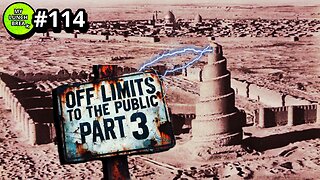Premium Only Content

Judge Napolitano Judging Freedom and Douglas Macgregor:F-16 in Ukraine
#eyesontheworld #douglasmacgregorinterview #judgenapolitano
#ukrainewar #judgingfreedom
August 21, 2023
Colonel Douglas Macgrego answering questions: How bad is Ukraine loosing the war with Russia? Does it make military sense for Ukraine to continue fighting? President Zelensky thanks the West for F-16s. Will F-16s make a difference? Is Russia willing to negotiate peace?
Is Ukraine war pushing China to co-operation with Russia?
Judge Andrew P. Napolitano is a graduate of Princeton University and the University of Notre Dame Law School. He is the youngest life-tenured Superior Court judge in the history of the State of New Jersey. He sat on the bench from 1987 to 1995, when he presided over more than 150 jury trials and thousands of motions, sentencings, and hearings. As Fox News’ Senior Judicial Analyst from 1997 to 2021, Judge Napolitano gave 14,500 broadcasts nationwide on the Fox News Channel and Fox Business Network. He is nationally known for watching and reporting on the government as it takes liberty and property. The Judge is the author of nine books on the U.S. Constitution, two of which have been New York Times Best Sellers. His most recent book, SUICIDE PACT: The Radical Expansion of Presidential Powers and the Assault on Civil Liberties.
Douglas Abbott Macgregor (born January 4, 1947) is a retired U.S. Army colonel and government official, and an author, consultant, and television commentator. He played a significant role on the battlefield in the Gulf War and the 1999 NATO bombing of Yugoslavia. His 1997 book Breaking the Phalanx established him as an influential if unconventional theorist of military strategy. His thinking contributed to the US strategy in its 2003 invasion of Iraq. On November 11, 2020, a Pentagon spokesperson announced that Macgregor had been hired to serve as Senior Advisor to the Acting Secretary of Defense, a post he held for less than three months. Macgregor was the "squadron operations officer who essentially directed the Battle of 73 Easting" during the Gulf War. Facing an Iraqi Republican Guard opponent, he led a contingent consisting of 19 tanks, 26 Bradley Fighting Vehicles and 4 M1064 mortar carriers through the sandstorm to the 73 Easting at roughly 16:18 hours on 26 February 1991 destroyed almost 70 Iraqi armored vehicles with no U.S. casualties in a 23-minute span of the battle. He was at the front of the formation in the center with Eagle Troop on the right and Ghost Troop on the left. Macgregor designated Eagle Troop the main attack and positioned himself to the left of Eagle Troop. Eagle Troop Scouts subsequently followed Macgregor's tank through a minefield during which his crew destroyed two enemy tanks. As Macgregor was towards the front of the battle involved in shooting, he didn't "request artillery support or report events to superiors until the battle was virtually over, according to one of his superior officers". The risks he undertook "could have been criticized had the fight turned ugly". At a November 1993 exercise at the Army's National Training Center (NTC) at Fort Irwin, Lt. Col. Macgregor's unit vastly outperformed its peers against the "Opposition Force (OPFOR)". The series of five battles usually end in four losses and a draw for the visiting units; his unit won three, lost one, and drew one. Macgregor's unit dispersed widely, took unconventional risks, and anticipated enemy movements. Macgregor was "one of the Army's leading thinkers on innovation", according to journalist Thomas E. Ricks. He "became prominent inside the Army" when his book Breaking the Phalanx was published in 1997, arguing for radical reforms. Breaking the Phalanx was rare in that an active duty military author was challenging the status quo with detailed reform proposals for the reorganization of U.S. Army ground forces. The head of the Army, United States General Dennis Reimer, wanted to reform the Army and effectively endorsed Breaking the Phalanx and passed copies out to generals; however, reforming the U.S. Army according to the book met resistance from the Army's de facto "board of directors" — the other four-star Army generals — and Reimer did not press the issue. Breaking the Phalanx advocated that "the Army restructure itself into modularly organized, highly mobile, self-contained, combined arms teams that look extraordinarily like the Marine Corps' Air Ground Task Forces". Many of Macgregor's colleagues thought his unconventional thinking may have harmed his chances for promotion. While an Army NTC official called him "the best war fighter the Army has got," colleagues of Macgregor were concerned that "the Army is showing it prefers generals who are good at bureaucratic gamesmanship to ones who can think innovatively on the battlefield."
-
 1:26
1:26
World News and Events
20 days agoAn Explosion and massive fire at the Martinez Refining Company in California
95 -
 14:55
14:55
Exploring With Nug
10 hours ago $8.88 earnedWe Found Semi Truck Containers While Searching for Missing Man!
44K7 -
 27:57
27:57
MYLUNCHBREAK CHANNEL PAGE
17 hours agoOff Limits to the Public - Pt 3
86.6K57 -
 38:07
38:07
Michael Franzese
10 hours agoLeaving Organized Crime and Uncovering Mob in Politics: Tudor Dixon and Michael Franzese
78.6K15 -
 2:42:54
2:42:54
Jewels Jones Live ®
2 days agoAMERICA IS BACK | A Political Rendezvous - Ep. 111
64.3K46 -
 8:47:33
8:47:33
Due Dissidence
1 day agoLIVE: Workers Strike Back Conference ft. Chris Hedges, Jill Stein, Kshama Sawant, and More!
106K56 -
 8:36:37
8:36:37
Right Side Broadcasting Network
5 days agoLIVE REPLAY: CPAC 2025 Day Three with President Donald J. Trump - 2/22/25
442K97 -
 1:05:34
1:05:34
The Big Mig™
18 hours agoConfirmed Kash Patel New FBI Director, Bring On The Pain |EP483
105K29 -
 53:59
53:59
Tactical Advisor
14 hours agoThe Vault Room Podcast 009 | Everyone Getting $5000?!
82.7K12 -
 2:04:44
2:04:44
TheAlecLaceShow
1 day agoLive at CPAC | Interviews with Dean Cain, Rep. Comer and more! | The Alec Lace Show
88.7K10